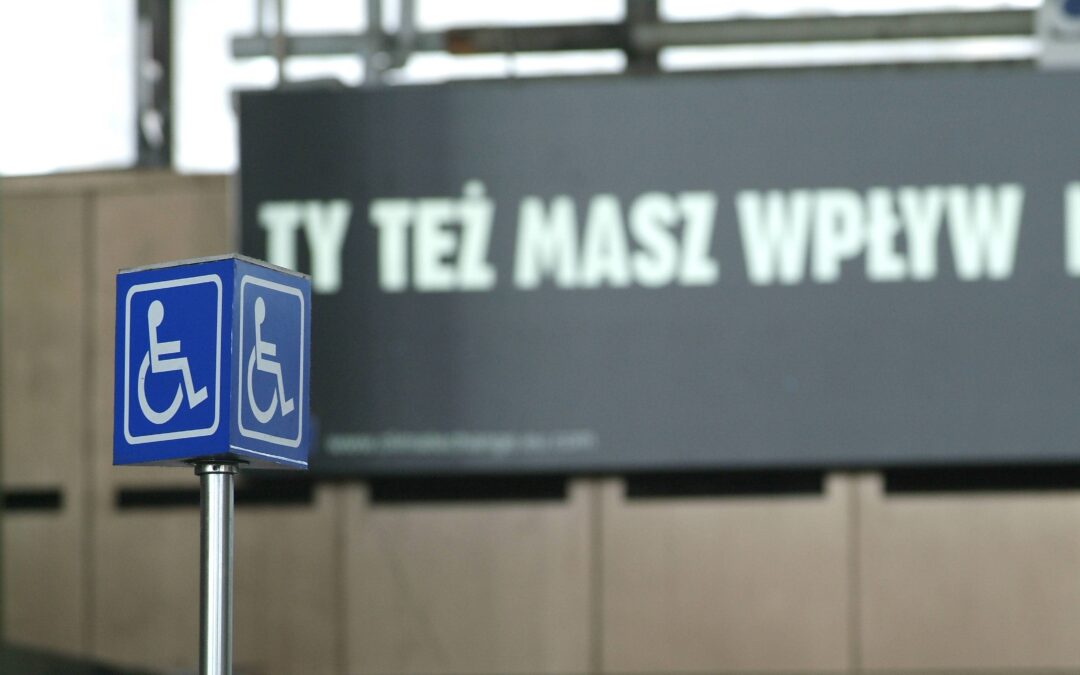Just 29 out of 526 railway stations in Poland are fully adapted to the needs of disabled people, according to a statement from the infrastructure ministry in response to a parliamentary question.
The ministry says that work to improve access to public transport for disabled people is ongoing. But the MP who enquired about the issue – Paulina Matysiak of Left Together (Lewica Razem) – says that, even where infrastructure is improved, there is a lack of consultation with those who use it.
Matysiak was prompted to ask the question by a video posted on Facebook showing how tactile paving for visually impaired people at Szczecin’s main train station led them to walk into a wall rather than into the building.
“This is not an individual situation,” the MP noted, as disabled people also have difficulties accessing trains or the station in other cities. The same Facebook page has highlighted similar problems at Warsaw Central station.
Most of the 497 stations in Poland that are not yet fully adapted for disabled passengers do contain elements of infrastructure aimed at people with particular needs, said Andrzej Bittel, an official at the infrastructure ministry responsible for combating transport exclusion, in response to Matysiak’s question.
Some 316 stations have a voice information system in place, 318 offer easy access to the building to people with mobility problems, especially wheelchair users, 179 have disabled toilets, 89 tactile paving, and 50 offer maps with Braille, according to Bittel.
The ministry’s spokesman added that work is continuing to adapt infrastructure for passengers with limited mobility, and that the station investment plan currently being implemented by PKP, the Polish state railway operator, will complete work at 174 stations by the end of 2023, reports Niepelnosprawni.pl, a disability website.
According to Matysiak, however, even when accessibility infrastructure is implemented, this is often done without consulting NGOs working with affected people, who are only asked their opinion “magnanimously” after renovations have taken place.
“It would be good if blind and partially sighted people had a much greater input into testing the signs they use,” she wrote. “Otherwise, disabled people will still clash with Polish reality and end up like in the case of the station in Szczecin – against a brick wall.”
Work to make railway infrastructure more usable for disabled people is part of the government’s Accessibility Plus programme, launched in 2018, which pledged 23 billion zloty over seven years to helping people with disabilities “overcome barriers” and “increase their space of freedom”.
Most of Poland’s largest railway stations have been extensively modernised over the last decade, but a National Audit Office (NIK) report from 2019 found that some of them still had major accessibility issues for disabled passengers.
Six of the seven stations NIK tested, four of which were in major cities, had problems with accessibility for people with visual impairments, such as a lack of or incomplete tactile paving, lifts without audio signals, poor audibility of announcements, and lack of information in Braille, reports Prawo.pl.
Other problems included defects with induction loop systems for hearing-impaired people, inaccessible ticket machines, and even disabled toilets which could only be entered after picking up a key from a room only accessible by stairs.
But there have been some improvements in Poland, particularly in large cities. In 2019, Warsaw won the EU’s Access City Award in recognition of its success in making all 30 of its metro stations accessible and renovating all buses and many bus stops to improve accessibility. (Warsaw Central train station is under the authority of PKP rather than municipal authorities.)
Main image credit: WALDEMAR KOMPALA / AGENCJA GAZETA

Ben Koschalka is a translator, lecturer, and senior editor at Notes from Poland. Originally from Britain, he has lived in Kraków since 2005.




















